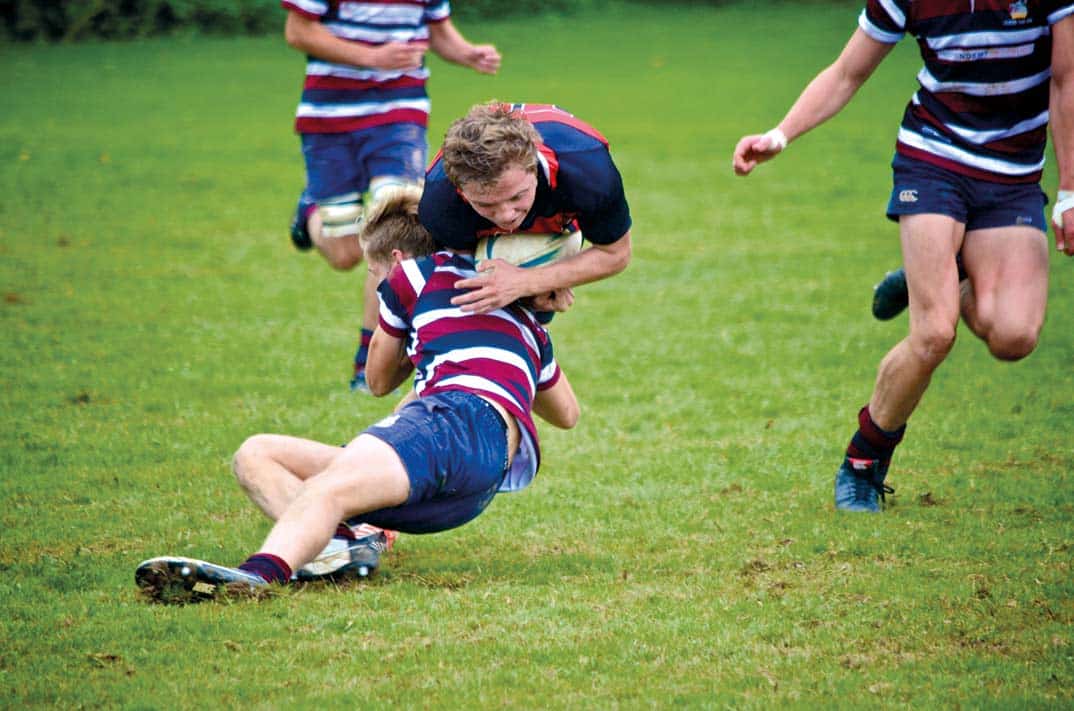After 70 doctors, sports scholars and academics wrote an open letter to Government ministers and chief medical officers last week calling for a ban on physical tackling in school rugby matches it still remains to be seen whether educational policy will be changed.
Here in Tunbridge Wells contact rugby is played in many of the private and state schools including Holmewood House and Skinners’.
The latter has as many as 18 teams playing regularly and last week its Head of Sport, Simon Jervis, sent out a letter to parents outlining its stance on the subject.
“At Skinners’ we take the safety of students very seriously. We ensure all boys are given clear and detailed coaching to ensure they are fully aware of how to tackle before they are exposed to any full contact of the game.” he said.
“It is crucial that we remember the positive benefits of rugby for all ages, including increasing confidence, self-esteem and self-discipline, as well as getting enjoyable physical exercise while working as part of a team.”
When the Times approached Mr Jervis for a comment on the risks involved he told us: “We have trained medical staff at all matches to deal with any injuries and follow the strict RFU protocols when it comes to injuries such as concussion.
“To date this year after 223 competitive matches across all age groups from U12 through to U18 we have only had five reported incidents of concussion. There have only been three incidents that have required hospital attention of which none stayed in overnight and none were long-term injuries.”
Skinners’ is part of Community Rugby Injury Surveillance and Prevention (CRISP) – a Rugby Football Union (RFU) and University of Bath initiative which monitors data from community rugby matches in order to reduce the risk of injury.
Critics of contact rugby, however, argue that risks for players under 18 are still high and that two thirds of injuries and concussions from the high-impact collision sport are a direct result of aggressive tackles which can, for some, mean life-changing consequences.
As an alternative, concerned doctors are urging schools to play non-contact and touch rugby. These are simpler versions of the full game but there is no tackling, mauling, rucking, scrums, lineouts or kicking of the ball.
Among the signatories of the letter sent to Government ministers last week was Professor Allyson Pollock, a professor of public health research and policy at Queen Mary University of London. She commented: “Parents expect the state to look after their children when they are at school. Rugby is a high-impact collision sport and given that children are more susceptible to injuries such as concussion, the absence of injury surveillance systems and primary prevention strategies is worrying.”
A spokesman for the RFU, however, said they had carried out a three-year injury prevention and surveillance study on schoolboy injuries, as well as implementing a guidance programme known as RugbySafe.
He added: “We believe that high quality coaching, officiating, medical support and appropriate player behaviour in line with the core values all contribute to reducing the risk of injury occurring.”
The RFU also said it took player safety ‘extremely seriously’ and that recent changes to how it is taught at junior level meant young players underwent a ‘gradual and managed’ introduction to contact rugby.
The Department of Education echoes these views. In a statement issued last week a spokeswoman said: “Team sports, such as rugby, play an important role in developing character. They can help children and young people develop positive traits, such as fair play, leadership and resilience, and teach them how to bounce back from defeat, how to respect other and how to work together in teams to achieve a goal.”








